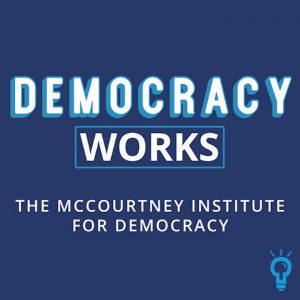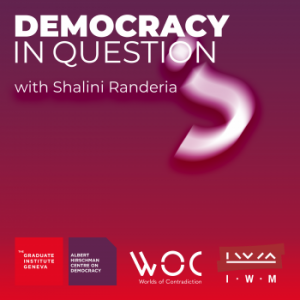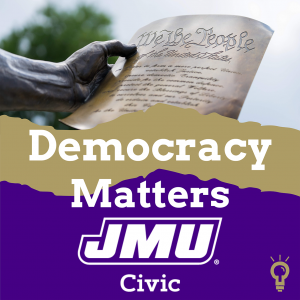According to recently released poll results from the Harvard University Kennedy School’s Institute of Politics, young Americans are concerned about the current state of democracy in the United States. More than half, 52% polled, believe that the U.S.’s democracy is either “in trouble” or a flat out “failed democracy.” This routine poll surveyed more than 2,100 young people, between the ages of 18 to 29, conducting interviews in both English and Spanish. Though there were some partisan divides, almost 50% of young Democrats and 70% of young Republicans described the United States’ democracy as either in trouble or failed. The poll also found that nearly half of young Republicans believe there is a 50% chance or better that they will see a second civil war in their lifetime.
This bleak report echoes recent findings from International Institute for Democracy and Electoral Assistance (IDEA), a Swedish-based organization that supports sustainable democracy worldwide and generates reports on the global state of democracy around the world. For the first time in its history, International IDEA labeled the United States as a “backsliding democracy”. The organization used 28 indicators of democracy based on five core pillars to measure the state of democracy in 2020 and 2021. Those five pillars include representative government, fundamental rights, checks on government, impartial administration and participatory engagement. A co-author of the report indicated that the United States remains a high-performing democracy, even improving in certain indicators, but the decline in civil liberties and checks on government demonstrate serious problems with the country’s democracy.
The trajectory for the rest of the world did not fare much better than the United States. According to the International IDEA, the world is currently seeing the lowest number of democracies, 98, in many years. This number is juxtaposed against the other government categories, hybrid and authoritarian. It’s the group’s assessment that there are 20 hybrid governments, including Turkey and Russia and 47 authoritarian regimes including countries like Saudi Arabia, China and Ethiopia. Globally, more than two in three people live in either an authoritarian regime, hybrid nation or backsliding democracy. Continuing this theme, the report found that the number of countries trending toward authoritarianism in 2020 outnumbered the countries moving in a more democratic trajectory, a finding echoed by global monitoring organization Freedom House in their own report on the state of global freedom.
It is in the shadow of these reports that the United States will host the “Summit for Democracy”. On December 9 and 10, 2021, the Biden Administration will host over one hundred countries in a virtual summit with the goal of discussing challenges and opportunities facing democracies and providing a platform for leaders to announce their commitments to defending democracy and human rights. Some key themes to be addressed during the meeting include defending democracies against authoritarianism, addressing and fighting corruption, and promoting respect for human rights.
This week’s Current Events resources examine the current state of democracy around the world and within the United States. The resources shared provide context and the ability to explore the fundamentals of democracy, as well as the some of the reasons why democratic governments around the world may be seeing a decline.
Looking for more current events resources? Sign up at our We the Teachers Educator Resource Community page, where you can find all of our Current Events, and learn about our other programs!
Essential Questions, Vocabulary & Extend the Resources:
- What are essential components of a healthy democracy?
- How can citizens work to ensure their nation’s democracy is healthy?
- What are the fundamental differences between a democracy and an autocratic government?
- What role does media, both legacy and social, play in the health of a democratic government?
- How important is it for the citizens of a democracy to believe in their form of government? Explain.
- Should the United States be the world’s driving force of democracy? If not, should another country take up this mantle? If so, whom and why?
- In your opinion, what are some of the primary causes the world is seeing a backsliding amongst democratic nations?
Click here for a hardcopy of the Essential Questions & State of Democracy Vocabulary
Click here for a hardcopy of the Extend the Resources handout with suggested lesson activities and extensions
Videos:
Podcasts:
Tom Nichols on democracy’s worst enemy, Democracy Works, NPR, October 25, 2021
What keeps democracies alive?, Democracy in Question, The Graduate Institute of Geneva, June 17, 2021
How the U.S. became a ‘backsliding democracy’ according to a European think tank, All Things Considered, NPR, November 25, 2021
Democracy’s Struggle Against Itself featuring Dr. Kevin Casas-Zamora, Democracy Matters Podcast
Background Resources:
The Global State of Democracy Report 2021, International Institute for Democracy and Electoral Assistance (International IDEA)
Democracy, United Nations
The Summit for Democracy, U.S. Department of State
Recent Articles:
US added to list of ‘backsliding’ democracies for first time, The Guardian, November 22, 2021
Democracy is declining in the U.S. but it’s not all bad news, a report finds, NPR, December 1, 2021
Northern California Town Declares Itself a ‘Constitutional Republic’ in Response to State’s COVID-19 Mandates, NBC Bay Area, December 1, 2021
The majority of young Americans think democracy is in big trouble, according to a new poll, Fortune, December 1, 2021
Profiling Modi’s India, Foreign Policy, November 28, 2021
U.S. Allies Drive Much of World’s Democratic Decline, Data Shows, The New York Times, November 16, 2021
NATO Chief Says U.S. Capitol Attack Shows Democracy Under Threat, Bloomberg, November 30, 2021
What Happens to Democracy When Local Journalism Dries Up?, The Washington Post Magazine, November 30, 2021
Recent Editorials:
Biden’s Global Democracy Summit Raises an Awkward Question: Can Ours Endure?, The New Yorker, November 30, 2021
Democracy in retreat even in United States, Herald & Review republished from South Florida Sun-Sentinel, November 20, 2021
Civil dialogue, engagement can renew democracy, The Atlanta Journal-Constitution, September 7, 2021
Articles for Elementary Students:
The difference between a democracy and a republic, Newsela
Comparing governments: democracy vs. authoritarianism, Newsela
The Role of Voting in American Democracy, Newsela
How can governments represent people?, Newsela
Lesson Plans:
Is Democracy at Risk? A Lesson Plan for U.S. and Global History Classes, The New York Times
Appreciating Democracy: A Lesson Plan for High School Teachers of Civics, Government, and U.S. History, Eagleton Institute of Politics of Rutgers University
Assessing the Strength of Democracy, Facing History & Ourselves
Civic engagement and how students can get involved, PBS Newshour Extra
Democracy – A short introduction, TedEd
Media & News Literacy Lesson Plans:
Media Literacy Resources – Newseum
News & Media Literacy Lessons – Common Sense
Media Misinformation, Viral Deception, and «Fake News» – University of Wyoming
Evaluating Sources in a ‘Post-Truth’ World: Ideas for Teaching and Learning About Fake News – New York Times Lessons




